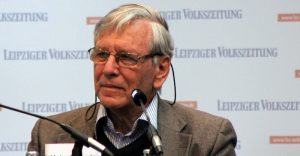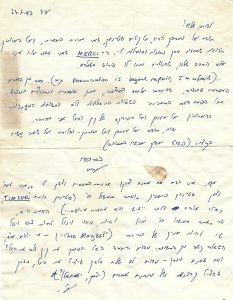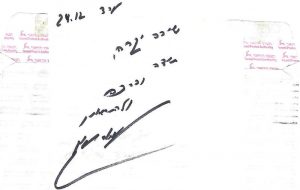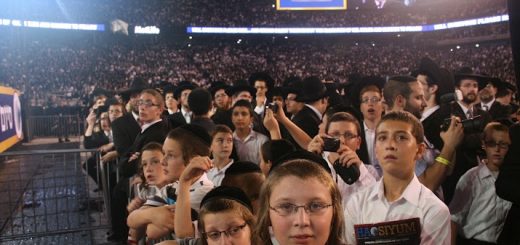Amos vs. Amos Oz

The Israeli media has been focused on the late Amoz Oz, whom many consider Israel’s top writer and who passed away a fortnight ago. The world media also gave Oz’s passing a great deal of attention. I felt ambivalent. I first discovered him in his book Here and There in the Land of Israel, and was mesmerized. His Hebrew writing is superb, and his lectures even better. See for example Amos Oz on Israel:Between Love and Darkness, on his semi-autobiographical book, A Tale of Love and Darkness. During the years I lived in Beer Sheva I decided to audit courses he gave on Agnon at Ben-Gurion University. When he lectured at conferences in English, I would jot down some of the very few and minor mistakes in English grammar or pronunciation and send the corrections to him, unsolicited. He appreciated the feedback. Sometimes I criticized his take on Biblical passages, and we developed a short correspondence. When I learned of his passing, I reviewed the letters from him, especially those where he argued that he was troubled by many Biblical passages. For example, in response his citing Cain and Abel, I quoted a passage from Steinbeck’s East of Eden, which has a discussion of the phrase from Gen.4:7, “atta timshel bo.” Steinbeck, who was not Jewish, opts for translating “timshel” [sic] as “thou mayest rule over it” –man can choose to rule over his passions.
Amos Oz retorted with a question, Why did the Creator not stay the hand of Cain, just as he prevented Isaac from being sacrificed, or Ishmael from dying? I understood that Oz implied that it was, so to speak, the Creator’s fault.
 One thing we did agree upon was the ignorance of the Bible and Jewish texts in the contemporary Israeli non-religious sector. Amos complained in a lecture to the University’s Board of Governors, “If I say: Do not tell it in Gat, the average Israeli has no idea what I am talking about, has no inkling this is from the Bible.” [2Sam.1:20] The books by Oz are studded with hundreds of Biblical phrases, which the average Israeli won’t appreciate. In Oz’s epistolary novel, Black Box, a disillusioned immigrant says about coming to Eretz Israel, “In the dream myrrh and frankincense… and in the morning, behold, it was Leah. What Leah? Malaria. Ottoman Asia.” Most young Israelis haven’t a clue why Leah is invoked here.
One thing we did agree upon was the ignorance of the Bible and Jewish texts in the contemporary Israeli non-religious sector. Amos complained in a lecture to the University’s Board of Governors, “If I say: Do not tell it in Gat, the average Israeli has no idea what I am talking about, has no inkling this is from the Bible.” [2Sam.1:20] The books by Oz are studded with hundreds of Biblical phrases, which the average Israeli won’t appreciate. In Oz’s epistolary novel, Black Box, a disillusioned immigrant says about coming to Eretz Israel, “In the dream myrrh and frankincense… and in the morning, behold, it was Leah. What Leah? Malaria. Ottoman Asia.” Most young Israelis haven’t a clue why Leah is invoked here.
 So why do I feel so ambivalent? Amoz Oz was the ultimate secularist. He was honest about this. He saw Jewish culture, especially the written culture, as replacing Torah and mitzvot. He wrote, with his daughter, a book about books and written Jewish culture, Jews and Words, which they saw as a substitute for Jewish religion.
So why do I feel so ambivalent? Amoz Oz was the ultimate secularist. He was honest about this. He saw Jewish culture, especially the written culture, as replacing Torah and mitzvot. He wrote, with his daughter, a book about books and written Jewish culture, Jews and Words, which they saw as a substitute for Jewish religion.
I finally understood my ambivalence when I read the transcript of a symposium of Amoz Oz and rabbis published last week in Makor Rishon. Said Rabbi Aharon Lichtenstein, z”l, referring to the gap between the secular and religious sectors(my translation):
“The sides are not symmetrical. We want the general population to be exposed to more Torah; we want Rabbis to be invited to secular schools and to the army. But I have to admit that I am not ready to be ‘fair’ and let the secularists come to our yeshivas. …Our responsibility to the spiritual world of our students is more important than ‘fairness.’ You can agree or not agree. I hope Amos Oz will understand and not be angered. But there are issues for which I am ready to suffer his anger.”
Referring to the world of the secular kibbutz, where Amos Oz lived for decades,. Rav Lichtenstein said further:
“If I have to choose between the world symbolized by Ponevezh Yeshiva and that symbolized by the kibbutzim I will not hesitate for a second….We don’t want to isolate ourselves in a corner [away from the general culture], but from a basic existential viewpoint, in our kishkes [sic] the answer is clear. This may disappoint you, and maybe you thought us more liberal, but this is the truth and you shouldn’t be surprised by that statement… Let me add that that there is no Judaism without the element of bakashat Hashem…”
The full transcript is on the Makor Rishon website, “Yahadut, Girsat Amoz Oz.”
Maybe it is not just a gap, but rather a chasm. The prophet Amos asked rhetorically, “Can two walk together except they be agreed?” (3:3) Sometimes we have to choose between Amos and Amos Oz.



I am reminded of an incident involving Rabbi David Ellenson, the scholarly former head of the Reform rabbinical school. Undoubtedly, Bibi Netanyahu is schooled by the chareidi members of his coalition. That said, he said his most important lesson came from Rabbi Ellenson, who told he was shocked to find that a dean of an Israeli university did not know what Havdalah was!!
when I traveled to Israel, I insisted business meeting take place in a hotel, to ensure kashrut. Back in 1995, a particular tech executive told me as we flew by helicopter over Har Etzion, that the Gush produces our best rabbis and investment bankers. (my son took the latter path. 🙂 ) He insisted on hosting me in his home, which would be catered by a kosher chef. That evening his wife told me, without any rancor: do you know how hard it is to find a good kosher caterer in Israel??? thank God, the arrival of the French, has changed that dramatically. I can now even enjoy Herbert Samuel cuisine in two (now one) locations.
Israel is changing; the secular community is making great strides. If only there were more traditional Jews able to engage and reciprocate.
From what I understand, the 19th century classical musical composer, Johannes Brahms, felt that the great music of his time had strayed too far from the ideals of the likes of Bach and Mozart, and so he composed his music with the intent of bringing music back to its classic fundamentals, and indeed, to this day, most people consider his music to belong to that earlier era. And yet when musical specialists carefully analyze his music, they realize that Brahms, much against his will, really was a product of his times. Then there is Sigmund Freud, who for most of us is almost the patron saint of rejecting our religious traditions, not only mocking the idea of our G-d, but also consciously turning to Greek myths to fuel his ideas rather than using his own Jewish traditions for that purpose. And yet I am aware of books that have been written, pointing out how in spite of himself, that Freud’s ideas are very much filled with the echoes of Judaism. I am thinking that this is what happened with Amos Oz as well. From what I have heard, he had an Orthodox Jewish upbringing, and then subsequently tried his best to reject those traditions, and yet in spite of himself, his works are filled with allusions to our Jewish traditions.
Why is this aspect of him what I noticed most about him? Well because something similar happened to me. I was brought up in a fairly traditional Jewish home and attended Orthodox Jewish schools throughout my childhood and teenage years, and then tried my darndest to run away from it all. I avidly read the works of the famous British philosopher Bertrand Russell, and even went to far as to fully immerse myself in my local Yoga (Hindu) community. But then something happened. The deeper I involved myself in all of that strange mixture of atheism and Eastern philosophy, the more I kept looking for Judaism within those heretical ideas and cultures. And even when I studied psychology in college, the first thing I would look for, is how Jewish were the ideas of the famous psychologists, almost all of whom at the time were Jewish. Even when I study American history, I look for how much it has been influenced by Judaism. Well, it finally dawned on me that instead of looking for sparks of Judaism in the world-at-large, that perhaps a more efficient way of studying Judaism is to study Judaism. And that is what I am finally doing these days, after decades of all that wandering in the symbolic desert.
Amos and Amos Oz were hardly diametric opposites. Both were highly critical of empty religious ritual. Both communicated prophetic messages that condemned the leadership and direction of the nation.
Sometimes it seems that the majority of American Jews proudly define Judaism as comprising Atheism, LIberalism, and Bagels. I don’t mean that derisively. It’s an idiosyncrasy of the Jews, and it has a history as old as Judaism itself.
Interesting to compare Agnon and Oz. Agnon’s writings assumed a knowledge of classical Jewish knowledge, Oz could be read well with essentially no knowledge of classical Jewish knowledge.